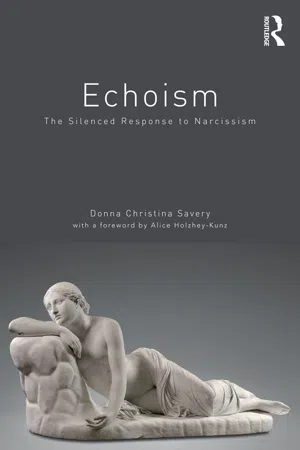Echo, a young and talkative nymph, leaves a clearing where Zeus, the thunder god, ruler of the gods on Mount Olympus, is cavorting with other nymphs. Suddenly she encounters the goddess Hera, wife of Zeus. Known for her loquaciousness, Echo uses her verbal prowess to charm the unsuspecting Hera with words, distracting the goddess from sounds of laughter emanating from her husband’s antics in the glade. On learning of this, the jealous goddess wreaks vengeance upon Echo, cursing her: “You shall no longer use your tongue to manipulate and deceive, from this moment you will be struck mute.” As an afterthought she adds, “Since you are so fond of having the last word, I will grant you that. You may repeat the last words of another, and your echo shall be a reminder to all of the power of the gods.” Echo is immediately struck dumb and loses the ability to communicate her original thoughts in words. Horrified at her loss of identity she hides away, unable to express her pain in words, with increasing resentment towards the goddess. Over time she begins to withdraw and fade from forest life. Without another with whom to converse, she begins to forget the sound of her own voice and she begins to lose the ability to make her thoughts manifest, and in so doing loses her connection to humanity. As she does so, her life force dwindles and she starts to fade away. One day there appears a youth, blessed with beauty and confidence, command and presence. He sees a movement in the trees and calls out, “Is anybody here?”
“Here,” replies a voice. “Come out and let me see you,” he calls, to which Echo appears with the words, “Let me see you.” “Young beauty,” calls Narcissus, to which Echo, suddenly filled with a voice, becomes enlivened, crying out enthusiastically as she runs towards the youth, “Young beauty!” But as she does so he notices the hollowness of her words, and sees the faded shell, asking her, “What do you want?” She is able only to repeat his last words and he becomes repulsed by this imitative creature in whom he sees no spirit, no challenge, with no life force of her own. “Go away,” he says, “you repulse me”, and as he pulls away Echo reaches out and clings all the more, knowing that without him she will again be reduced to a non-being. She is left to pine, and as she does, the life seeps out of her and her skin and bones meld into the rocks and shrubs where she lies, leaving her barely distinguishable from the insentient beings with whom she shares her existence. Narcissus, meanwhile, is cursed for his cruel treatment of Echo and others by Nemesis – so that he would love only himself and never another – following a prophecy made at his birth by Tiresias, the blind seer, that Narcissus would live a long life, “so long as he never knows himself.” (Ovid, 2004, Book 3.347).
Following this, one day he returns from hunting and drinks from a pool, in which he sees the most beautiful image of a young man. Unable to recognise himself in the reflection, he tries to speak with it. Reaching out his arms to it, as his hands enter the water, the youth disappears from him, only to reappear as he pulls back. Tormented by love and the wish to possess this unavailable and beautiful creature, Narcissus becomes mesmerised. Unable to eat, and sleep, he focuses only on the youth. Eventually, he too begins to fade away and with each cry there is an echo from the woods, reminding him of his cruel treatment of the nymph. As he dies, Echo laments the loss of he who gave her an existence and a voice, and a deep howl of resentment is heard in the grove as she surveys the tragic state of their remains and joins him in his death cries. Eventually, Narcissus, too, ceases to retain his human form, leaving only a flower, a symbol of his fate, in his place.
